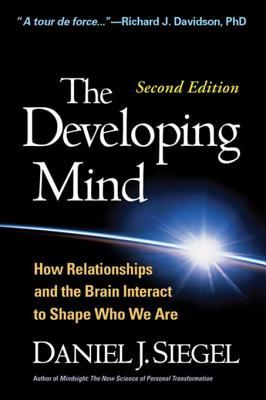
The Developing Mind: How Relationships and the Brain Interact to Shape Who We Are
Publisher
The Guilford Press
Publication Date
2/21/2012
ISBN
9781462503926
Pages
506
Categories
About the Author
Questions & Answers
Interpersonal relationships and brain development are deeply intertwined, influencing each other to shape human behavior and mental health. Early relationships, particularly with caregivers, shape the developing brain's structure and function through experiences that alter gene expression (epigenesis). Positive, secure attachments foster neural integration, promoting flexible and adaptive brain function. Conversely, insecure or disrupted attachments can lead to impaired neural integration, affecting self-regulation and mental health.
Interpersonal interactions also shape the mind by influencing how information is processed and integrated. Communication patterns, emotional expression, and shared experiences within relationships directly influence the brain's development, creating mental representations and shaping the individual's perception of reality. This interplay between relationships and the brain continues throughout life, with ongoing experiences and interactions further shaping brain architecture and mental health.
In summary, interpersonal relationships and brain development are interconnected, with relationships influencing brain development and the brain, in turn, influencing behavior and mental health.
The concept of "integration" plays a crucial role in the development of a healthy mind and brain. It refers to the process of linking differentiated parts into a functional whole, ensuring that various mental processes, neural circuits, and interpersonal relationships work together harmoniously. This integration allows for flexible and adaptive functioning, which is the essence of health.
In the brain, integration ensures that different regions communicate effectively, leading to optimal self-regulation and coordination. In interpersonal relationships, integration fosters secure attachments and mindful communication, which shape the developing brain's architecture and function. When integration is impaired, it can lead to chaos, rigidity, or both, which are indicators of mental health issues.
By promoting integration, individuals can cultivate a coherent sense of self, maintain healthy relationships, and develop a well-regulated brain. This, in turn, enhances emotional well-being, resilience, and overall mental health.
Attachment styles and early relationships significantly influence emotional regulation and resilience. Secure attachment, characterized by consistent, responsive, and attuned communication, fosters emotional regulation by teaching children to manage their emotions effectively. This leads to resilience, as secure relationships provide a safe haven for children to explore and learn from their experiences.
Insecure attachment, particularly disorganized attachment, can impair emotional regulation and resilience. Children with disorganized attachment may struggle with managing emotions, leading to difficulties in social interactions and emotional well-being. However, resilience can still develop through interventions that focus on building secure relationships, promoting emotional regulation skills, and addressing trauma or stress. Overall, the quality of early relationships shapes the foundation for emotional regulation and resilience throughout life.
The "embodied and relational" nature of the mind implies that our mental processes are deeply connected to our physical bodies and interpersonal relationships. This understanding has several implications for human experience and social interactions:
-
Interdependence: It emphasizes that our mental states are not isolated but interdependent on others, highlighting the importance of social connections in shaping our mental lives.
-
Mind-Brain Connection: It underscores the idea that the mind is not just a product of the brain but emerges from the interaction between neural processes and relational experiences, leading to a more holistic view of mental health.
-
Emotional Regulation: It suggests that emotions are integral to our mental processes and that healthy emotional regulation is crucial for well-being, as it involves integrating internal and interpersonal experiences.
-
Narrative and Memory: It explains how our memories and narratives are shaped by our relationships and experiences, influencing our sense of self and our understanding of the world.
-
Complex Systems: It aligns with complexity theory, showing that the mind is a complex system that self-organizes and adapts through interactions with the environment, including social interactions.
-
Integration: It emphasizes the importance of integration between mental, neural, and relational aspects for optimal functioning and well-being, suggesting that disintegration can lead to various psychological challenges.
-
Mindfulness and Awareness: It highlights the role of mindfulness and awareness in understanding and regulating our mental states, as well as in fostering healthy relationships and social interactions.
Understanding the developing mind can significantly inform therapeutic approaches and interventions for mental health issues by highlighting the importance of brain, mind, and relationships. This integrative perspective emphasizes the role of early experiences, particularly attachment and communication, in shaping brain development and mental health. Therapists can use this knowledge to:
-
Focus on Relationships: By understanding how interpersonal relationships shape the mind, therapists can create a supportive environment that fosters secure attachments and effective communication, promoting emotional well-being.
-
Address Trauma: Recognizing the impact of trauma on brain development can guide interventions that help individuals process and heal from past experiences, reducing the risk of long-term mental health issues.
-
Promote Integration: Therapies can target integration of brain functions, helping individuals develop flexible and adaptive ways of thinking and responding to life's challenges.
-
Utilize Mindfulness: Mindfulness practices can enhance self-regulation and emotional awareness, leading to improved mental health outcomes.
-
Tailor Interventions: By understanding individual differences in brain development and attachment styles, therapists can tailor interventions to meet the unique needs of each client.
